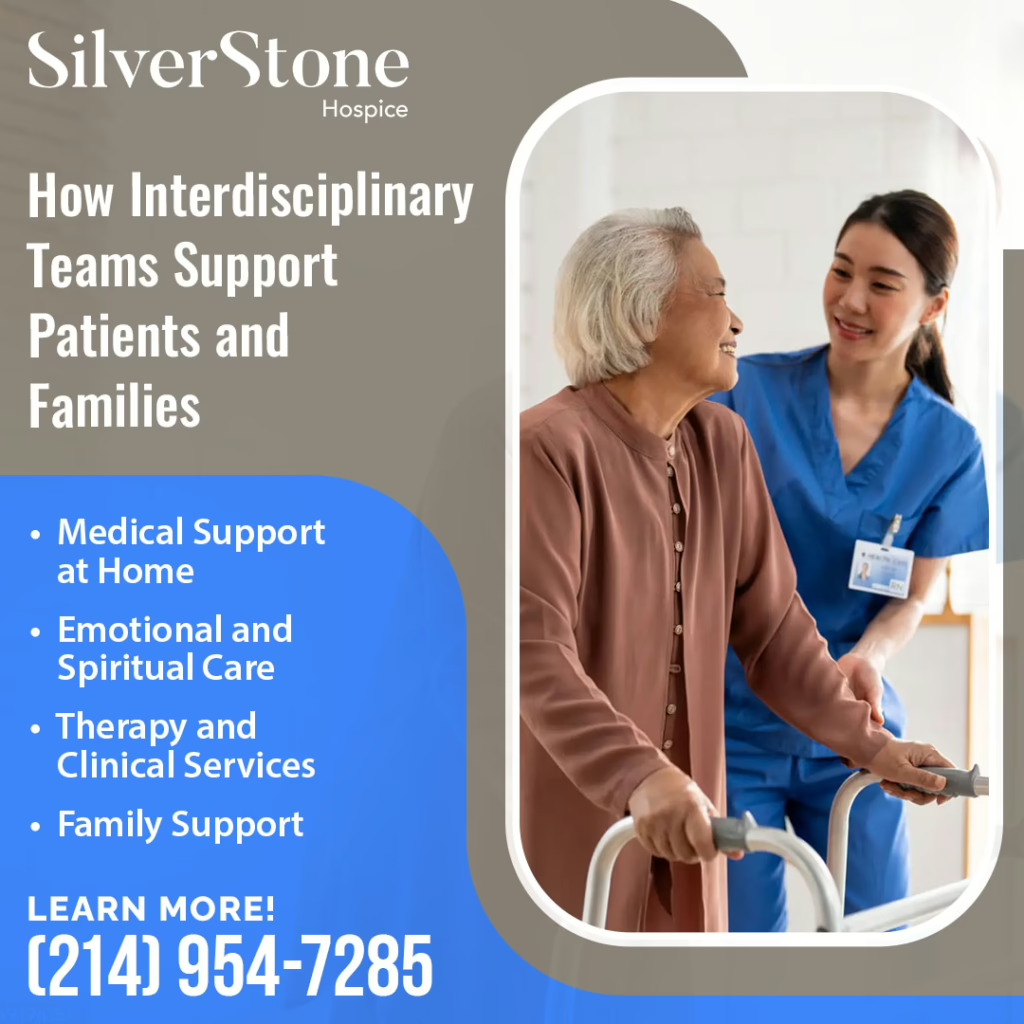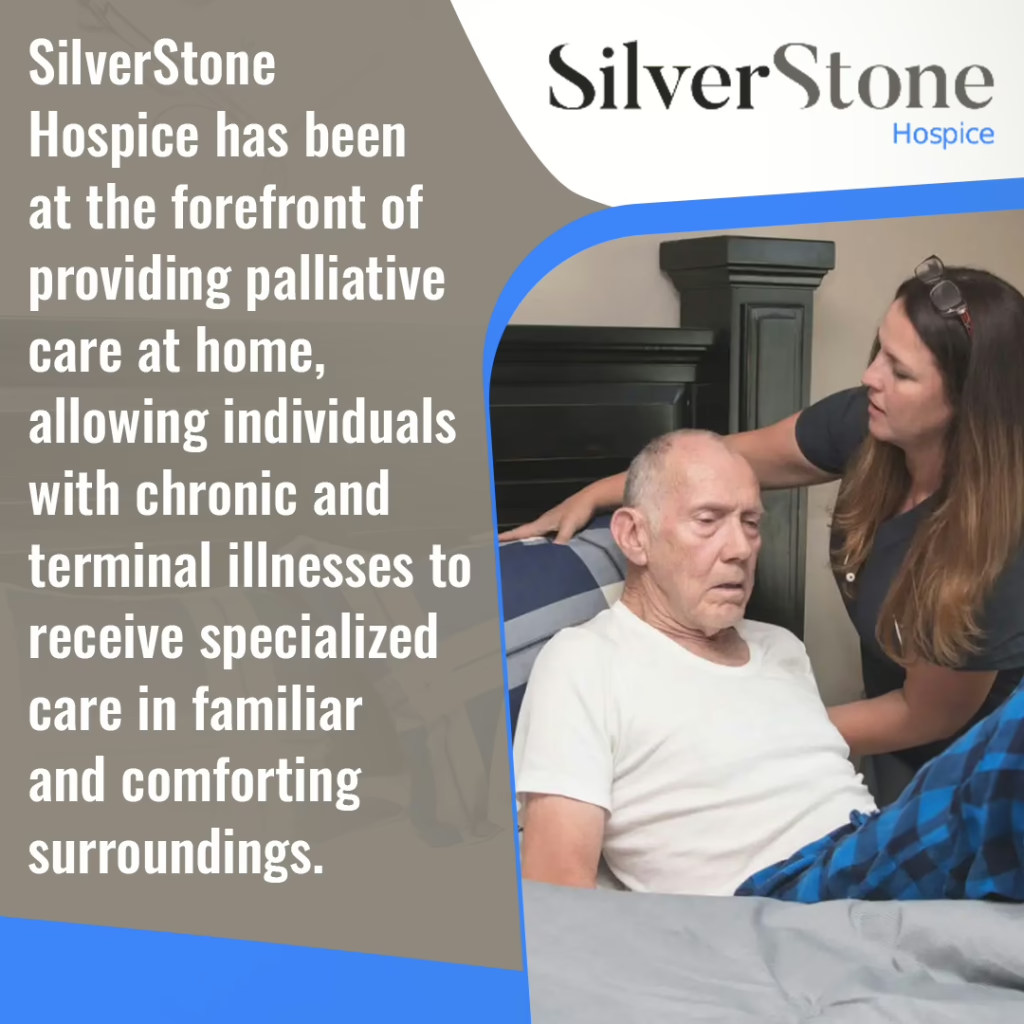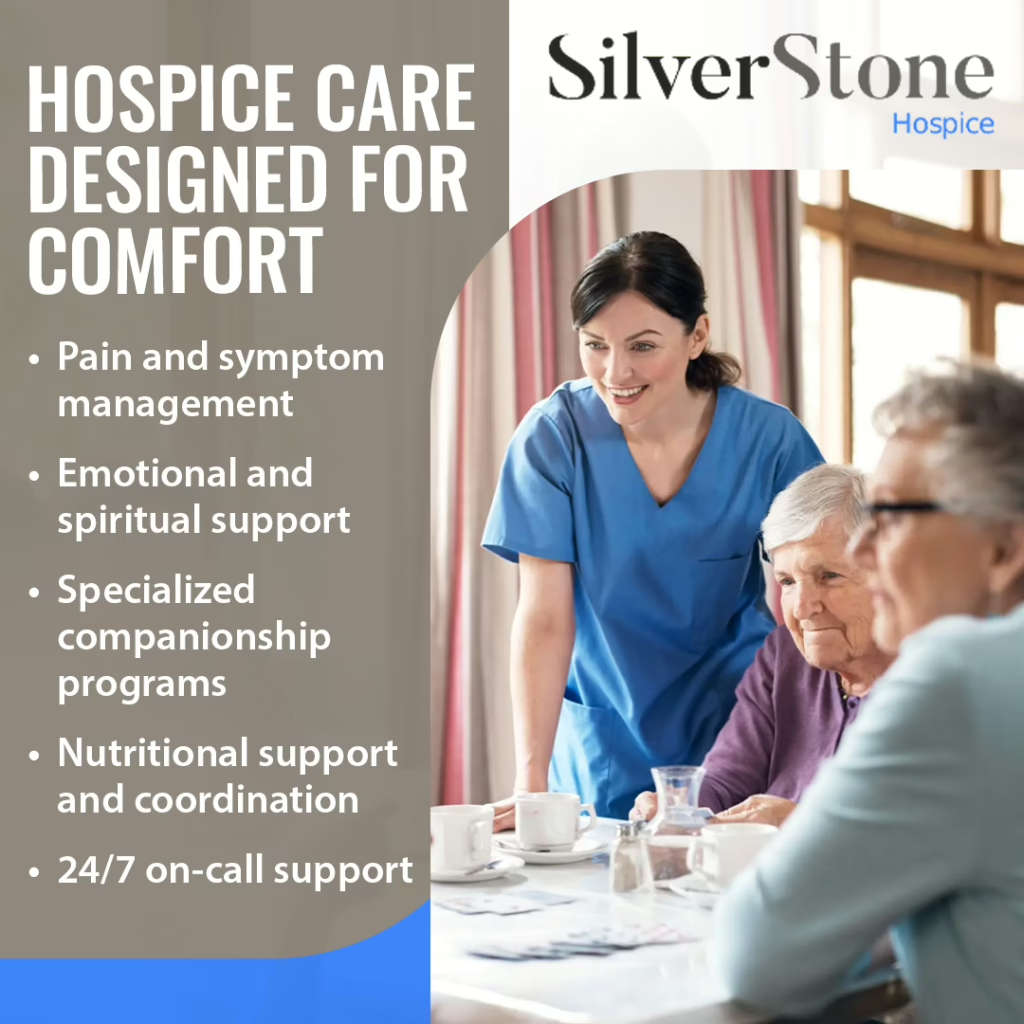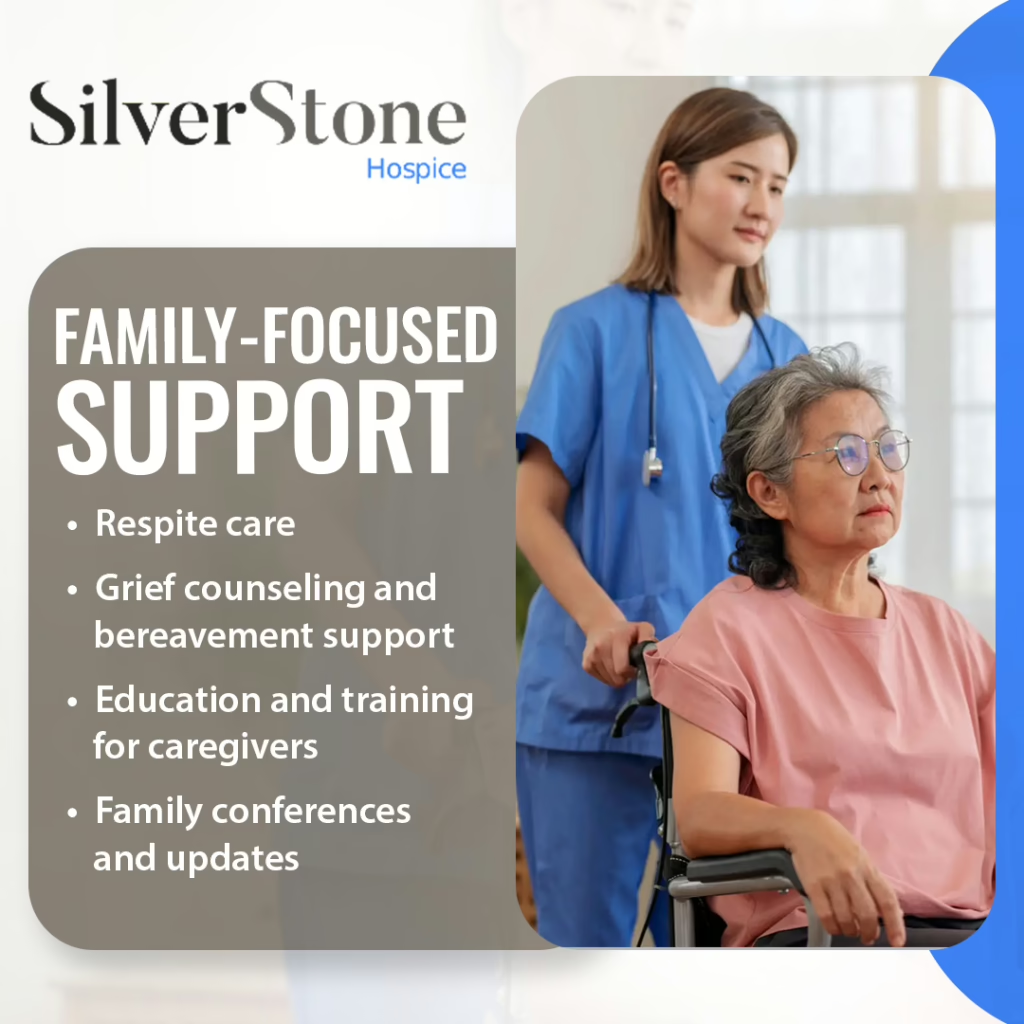
Synopsis
SilverStone Hospice in Dallas provides a compassionate, patient-centered approach to palliative care through expertly coordinated interdisciplinary teams. Their services, which include home-based support, ongoing treatments, and family education, prioritize the physical, emotional, and spiritual well-being of patients. With a commitment to dignity-driven care, they offer seamless communication, financial advocacy, and 24/7 availability. Certified by the American Heart Association®, SilverStone Hospice not only improves quality of life but also reduces hospitalizations and enhances outcomes for seriously ill individuals.
Key Takeaways
- Team-Based Support for Patient Well-Being: Palliative care at SilverStone includes coordinated efforts among doctors, nurses, social workers, chaplains, and therapists to address patients’ medical, emotional, and spiritual needs.
- Care That Includes Family Support: Families receive education, counseling, and temporary relief services to reduce stress and support decision-making.
- Home-Based Services for Greater Convenience: SilverStone provides lab testing, therapy, and wound care in the home to help reduce the need for hospital visits.
- Receiving Comfort and Treatment Together: Patients can continue treatment while also receiving care focused on comfort, without needing to choose between the two.
- Clear Communication Guides Better Outcomes: Ongoing updates and regular team discussions help align care plans with patient needs and preferences.
- Support with Financial Planning: SilverStone assists families in understanding insurance coverage and addressing cost-related concerns with thoughtful guidance.
Palliative care is a vital resource for families and patients facing serious illnesses, providing essential support that goes beyond traditional medical treatment. At SilverStone Hospice in Dallas, we recognize the importance of delivering complete care that addresses the physical, emotional, and spiritual needs of individuals during challenging times. Research indicates that high-quality palliative care improves patients’ quality of life and can lead to cost savings for healthcare systems, emphasizing the significance of integrated care models.
In Dallas, the demand for palliative care services continues to grow as both patients and healthcare providers recognize the benefits of this approach. Studies have shown that early palliative care consultations can lead to significant reductions in hospital costs and length of stay. For instance, a study published in the Journal of Palliative Medicine found that early palliative care consultations were associated with a reduction in hospital costs by aligning treatment plans with patient goals. Additionally, research indicates that palliative care can substantially reduce healthcare expenditures among advanced cancer patients.
Families in our community often face overwhelming emotional and logistical challenges when dealing with serious illnesses, making the collaborative efforts of interdisciplinary teams at SilverStone Hospice essential for managing symptoms and creating an environment of support and healing.
Palliative Care Explained
Palliative care is a specialized form of medical support aimed at providing relief from the symptoms and stress associated with serious illnesses. At SilverStone Hospice in Dallas, we focus on improving the quality of life for patients at any stage of their disease. Unlike conventional curative treatments, which aim to eradicate the illness, palliative care emphasizes symptom management and the overall well-being of the patient. This well-rounded approach recognizes that even while battling a serious condition, individuals deserve to live as fully and comfortably as possible.
One of the key aspects of palliative care is its patient-centered philosophy. This includes evaluating and addressing physical symptoms such as pain, nausea, fatigue, and shortness of breath. However, palliative care extends beyond physical healing; it also addresses emotional and psychological challenges. Patients often experience feelings of anxiety, depression, and confusion as they cope with their illness, and the palliative care team provides vital support through counseling and therapeutic interventions.
In addition to direct patient care, palliative care services also play a critical role in supporting families. Caregiving for someone with a serious illness can be overwhelming, and family members often struggle with their emotional well-being while trying to balance their responsibilities. Palliative care teams offer educational resources, respite care, and emotional support to family caregivers, helping to alleviate their stress and facilitate open communication about the patient’s preferences and wishes. This dual focus on both patients and their families is a defining characteristic of effective palliative care, promoting healing and connection even in difficult times.
Integrating palliative care into a treatment plan can help improve a patient’s quality of life, regardless of their medical condition. Choosing this type of care supports comfort and dignity, with a focus on compassionate support throughout the course of treatment.
The Interdisciplinary Team in Palliative Care
Palliative care relies on a diverse, interdisciplinary team that collaborates to provide tailored services focused on the unique needs of each patient. At SilverStone Hospice, our approach emphasizes seamless communication and coordination among team members to enhance patient care. Each professional plays a critical role, contributing their expertise to create an integrated support system for patients and their families. Here’s how our team at SilverStone Hospice is organized and how each member contributes:
Medical Support
- Physicians: Our board-certified physicians lead the palliative care team, conducting thorough assessments to understand each patient’s medical conditions and goals. They develop individualized care plans that prioritize symptom management, integrating input from other team members to adapt recommendations based on the patient’s evolving needs.
- Nurses: Nursing professionals play a central role in palliative care by providing around-the-clock support. They handle medication administration, track vital signs, and manage patient symptoms to maintain comfort. Nurses also help patients and their families understand treatment procedures and available care options.
Emotional Support
- Social Workers: Social workers bring emotional and psychological support to the team. They assist patients and families in coping with the challenges of serious illness by providing counseling and connecting them with community resources. They also facilitate sensitive discussions around advanced care planning and help address any social or financial concerns that may arise.
- Chaplains and Spiritual Care Providers: Recognizing the importance of spirituality in the healing process, chaplains provide spiritual and emotional support to patients and their families. They are available to offer guidance, listen to concerns, and help individuals find meaning during difficult times, reassuring families facing existential questions related to illness.
Clinical Support
- Therapists: Depending on the patient’s needs, physical therapists (PT), occupational therapists (OT), speech therapists (ST), and cognitive therapists (CT) may be involved in care. These specialists help patients regain or maintain their abilities, addressing mobility issues, assisting with daily living activities, and improving communication skills.
- Wound Care Specialists: Wound care specialists on our team provide in-home wound care services, allowing for timely management of injuries and conditions while minimizing the need for hospital visits. They assess wounds, administer treatments, and educate patients and families on proper wound care techniques to promote healing. This approach not only enhances comfort for patients but also considerably reduces the stress and disruption associated with frequent trips to healthcare facilities.
Patient Advocacy and Support
- Patient advocates: They make sure that the voices of patients and their families are heard throughout the care process. They help clarify treatment options, support decision-making, and provide information on patient rights, making certain that the care aligns with the patient’s goals and wishes.
How SilverStone Hospice’s Palliative Care Is Different
At SilverStone Hospice, we are committed to providing high-quality palliative care at home in Dallas. Our approach stands out for several reasons:
- Therapeutic Services: Our team includes physical, occupational, and speech therapists, enabling us to deliver tailored therapy in the comfort of the patient’s home.
- Curative Treatment Continuation: Patients can still receive curative treatments while being enrolled in our palliative care program, thus offering flexibility amid their care journey.
- Extensive Home Health Services: Our operating model allows us to conduct in-home lab work, testing, and X-rays without burdening the patient to travel.
- 24/7 Availability: Our team is available by phone whenever assistance is needed.
- Continuity of Care: Patients remain connected to their primary care physicians and specialists, receiving ongoing treatment while benefiting from the supportive services offered by SilverStone.
Recognized for Excellence in Palliative Care
SilverStone Hospice has been recognized for its leadership in palliative care by earning the Palliative/Hospice Heart Failure Certification from the American Heart Association®—the world’s leading nonprofit organization dedicated to heart and brain health. This certification affirms our commitment to delivering high-quality, evidence-based care that aligns with the Association’s rigorous, science-driven standards for supporting heart failure patients in palliative and hospice settings.
Communication Is the Backbone of Interdisciplinary Palliative Care
In palliative care, no one works in isolation. Physicians, nurses, social workers, chaplains, and other specialists come together like pieces of a puzzle—each bringing a unique perspective that helps complete the full picture of a patient’s needs. However, what makes this collaboration truly effective is clear, consistent communication.
Imagine a patient struggling with unmanaged pain. A nurse notices signs of discomfort during a routine check and flags the issue. That information flows to the physician, who may adjust medications. Meanwhile, the social worker is informed and checks in on the patient’s emotional well-being, while the chaplain offers spiritual support if needed. This isn’t just multitasking—it’s synchronized care.
Regular team meetings, shared documentation, and real-time updates make sure that everyone remains aligned. This level of coordination doesn’t just reduce the risk of errors—it makes patients feel seen, heard, and supported from every angle. In this model, care is not only more responsive—it’s more human.
Addressing Financial Aspects of Care
The financial side of palliative care often adds stress during an already emotional time. At SilverStone Hospice, we work closely with families to simplify this process, explaining insurance benefits, outlining potential out-of-pocket costs, and connecting them with financial assistance programs. Our goal is to lift that burden so families can stay focused on what truly matters: caring for their loved one with dignity and peace.
Services Included with SilverStone Hospice Palliative Care
- Medical Support: Expert management of pain, symptoms, and routine medical care to improve comfort and stability.
- Emotional Support: Counseling and emotional guidance for patients and families to help cope with the challenges of serious illness.
- Therapeutic Support: Access to therapies that promote mobility, independence, and day-to-day well-being.
- Care Coordination: Seamless communication among interdisciplinary team members to ascertain personalized, well-rounded care.
- Family Guidance: Education and support to help families understand care options, plan, and make the right decisions.
A Caring Partner for Your Palliative Care Journey
Palliative care at home in Dallas represents a compassionate, all-encompassing approach to managing serious illnesses. The work of interdisciplinary teams at SilverStone Hospice creates a supportive network that prioritizes patient comfort and dignity. By combining medical, emotional, and clinical services, we foster an environment where both patients and families can thrive, even in challenging circumstances.
For those seeking quality palliative care in Dallas, SilverStone Hospice is here to provide the support you need. Contact us today at (214) 954-7285 or info@silverstonehealthcare.com to discuss how we can help you or your loved one navigate this journey with empathy and expertise.
At SilverStone Hospice, we are committed to enhancing the quality of life for our patients through complete, patient-centered care. We look forward to supporting you or your loved one on this important journey.












